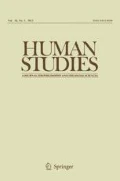Abstract
This paper examines the relation or, more precisely, tension between postmodern deconstruction and ethics by elaborating upon the ethico-political dimensions of deconstructionism. It embarks on a critical assessment of postmodern discourse on ethics in view of its political implications by analyzing Jacques Derrida's and Richard Rorty's arguments with an assumption that their positions represent a certain “logic” in the postmodern discourse on ethics. Postmodern ethics is based on incredulity with regard to traditional metanarratives, and it defines ethics in terms of sensitivity or responsibility to “otherness” and difference. Its proponents believe that the negation of modern “metanarratives” opens a way to the Other which has been marginalized and suppressed both in thought and in social practice. Derrida and Rorty represent this position with their emphasis on the ethical nature of deconstruction and the need to elaborate new languages for ethics. Despite postmodern appeal to ethics of this sort, however, postmodern thinking shows its limits in dealing with most ethical-political matters in the contemporary world. The postmodern approach to ethics, being restricted within the perspective of the individual, does not provide any determinate framework for deciding how to adjudicate conflicting ethical claims or how to link the unconditional affirmation of emancipatory ideals, enlightened social criticism, and democratic accountability in determinate political terms. In the main, this paper contends that philosophical deconstruction and “responsibility to otherness” undermine each other in the public sphere.
Similar content being viewed by others
References
Bauman, Z. (1991). Modernity and Ambivalence. Ithaca, NY: Cornell University Press.
Bernasconi, R. (1987). Deconstruction and the Possibility of Ethics. In J. Sallis (Ed.), Deconstruction and Philosophy. Chicago: University of Chicago Press.
Bernstein, R. (1991). The New Constellation. Cambridge, MA: MIT Press.
Best, S. and Kellner, D. (1991). Postmodern Theory: Critical Interrogations. New York: Guilford Press.
Bloom, H., et al. (1979). Deconstruction and Criticism. New York: Seabury Press.
Boyne, R. and Rattansi, A. (Eds.) (1990). Postmodernism and Society. New York: St. Martin's Press.
Carroll, D. (1987). Paraesthetics. New York: Methuen.
Cornell, D. (1992). The Philosophy of the Limit. New York: Routledge.
Critchley, S. (1992). The Ethics of Deconstruction. Oxford, UK: Blackwell.
De Beauvoir, S. (1991). The Ethics of Ambiguity. Trans. B. Frechtman. New York: Citadel Press.
Derrida, J. (1976). Of Grammatology. Trans. G.C. Spivak. Baltimore: John Hopkins University Press.
Derrida, J. (1978). Writing and Difference. Trans. A. Bass. Chicago: University of Chicago Press.
Derrida, J. (1981). Positions. Trans. A. Bass. Chicago: University of Chicago Press.
Derrida, J. (1982). Margins of Philosophy. Trans. A. Bass. Chicago: University of Chicago Press.
Derrida, J. (1983). The Principle of Reason: The University in the Eyes of its Pupils. Diacritics 19.
Derrida, J. (1984). No Apocalypse, Not Now (Full Speed Ahead, Seven Missiles, Seven Missives). Diacritics 20.
Derrida, J. (1985). Racism's Last Word. Critical Inquiry 12.
Derrida, J. (1988). Limited Inc. Evanston, IL.: Northwestern University Press.
Derrida, J. (1988). The Politics of Friendship. Journal of Philosophy 85.
Derrida, J. (1992). Force of Law: The ‘Mystical Foundation of Autonomy.’ In D. Cornell, M. Rosenfeld and D.G. Carlson (Eds.), Deconstruction and the Possibility of Justice. New York: Routledge.
Gasché, R. (1986). The Tain of the Mirror. Cambridge, MA: Harvard University Press.
Habermas, J. (1981). Modernity Versus Postmodernity. New German Critique 22.
Habermas, J. (1986). The New Obscurity. Philosophy and Social Criticism 11.
Habermas, J. (1987). The Philosophical Discourse of Modernity. Trans. F. Lawrence. Cambridge, MA: MIT Press.
Habermas, J. (1989). Work and Weltanschauung: The Heidegger Controversy from a German Perspective. Critical Inquiry 15. 28 HONGLIM RYU
Harvey, D. (1989). The Condition of Postmodernity. Oxford, UK: Blackwell.
Harvey, I. (1986). Derrida and the Economy of Différance. Bloomington, IN: Indiana University Press.
Jay, M. (1993). Force Fields. New York: Routledge.
Kamuf, P. (Ed.) (1991). A Derrida Reader. New York: Columbia University Press.
Kaplan, E.A. (Ed.) (1988). Postmodernism and its Discontents. London: Verso.
Kearney, R. (1984). Dialogues with Contemporary Continental Thinkers. Manchester: Manchester University Press.
Lawson, H. and Appignanesi, L. (Eds.) (1989). Dismantling Truth: Reality in the Post-Modern World. New York: St. Martin's Press.
Levinas, E. (1969). Totality and Infinity. Trans. A. Lingis. Pittsburgh: Duquesne University Press.
Levinas, E. (1981). Otherwise Than Being or Beyond Essence. The Hague: Martinus Nijhoff.
Lyotard, J.-F. and Thébaud, J.-L. (1985). Just Gaming. Trans. W. Godzich. Minneapolis: University of Minnesota Press.
Madison, G.B. (Ed.) (1993). Working through Derrida. Evanston, IL.: Northwestern University Press.
McCarthy, T. (1991). Ideals and Illusions. Cambridge, MA: MIT Press.
Norris, C. (1987). Derrida. Cambridge, MA: Harvard University Press.
Norris, C. (1992). Uncritical Theory. Amherst, MA: University of Massachusetts Press.
Rabinow, P. (Ed.) (1984). The Foucault Reader. New York: Pantheon Books.
Rawls, J. (1971). A Theory of Justice. Cambridge, MA: Harvard University Press.
Rorty, R. (1979). Philosophy and the Mirror of Nature. Princeton, NJ: Princeton University Press.
Rorty, R. (1982). Consequences of Pragmatism. Minneapolis: University of Minnesota Press.
Rorty, R. (1989). Contingency, Irony, and Solidarity. New York: Cambridge University Press.
Rorty, R. (1991a). Philosophical Papers, vol. 1: Objectivity, Relativism, and Truth. New York: Cambridge University Press.
Rorty, R. (1991b). Philosophical Papers, vol. 2: Essays on Heidegger and Others. New York: Cambridge University Press.
Ross, A. (Ed.) (1988). Universal Abandon: The Politics of Postmodernism. Minneapolis: University of Minnesota Press.
Sallis, J. (Ed.) (1987). Deconstruction and Philosophy. Chicago: University of Chicago Press.
White, S.K. (1991). Political Theory and Postmodernism. New York: Cambridge University Press.
Author information
Authors and Affiliations
Rights and permissions
About this article
Cite this article
Ryu, H. Ethics of Ambiguity and Irony: Jacques Derrida and Richard Rorty. Human Studies 24, 5–28 (2001). https://doi.org/10.1023/A:1010769718790
Issue Date:
DOI: https://doi.org/10.1023/A:1010769718790




